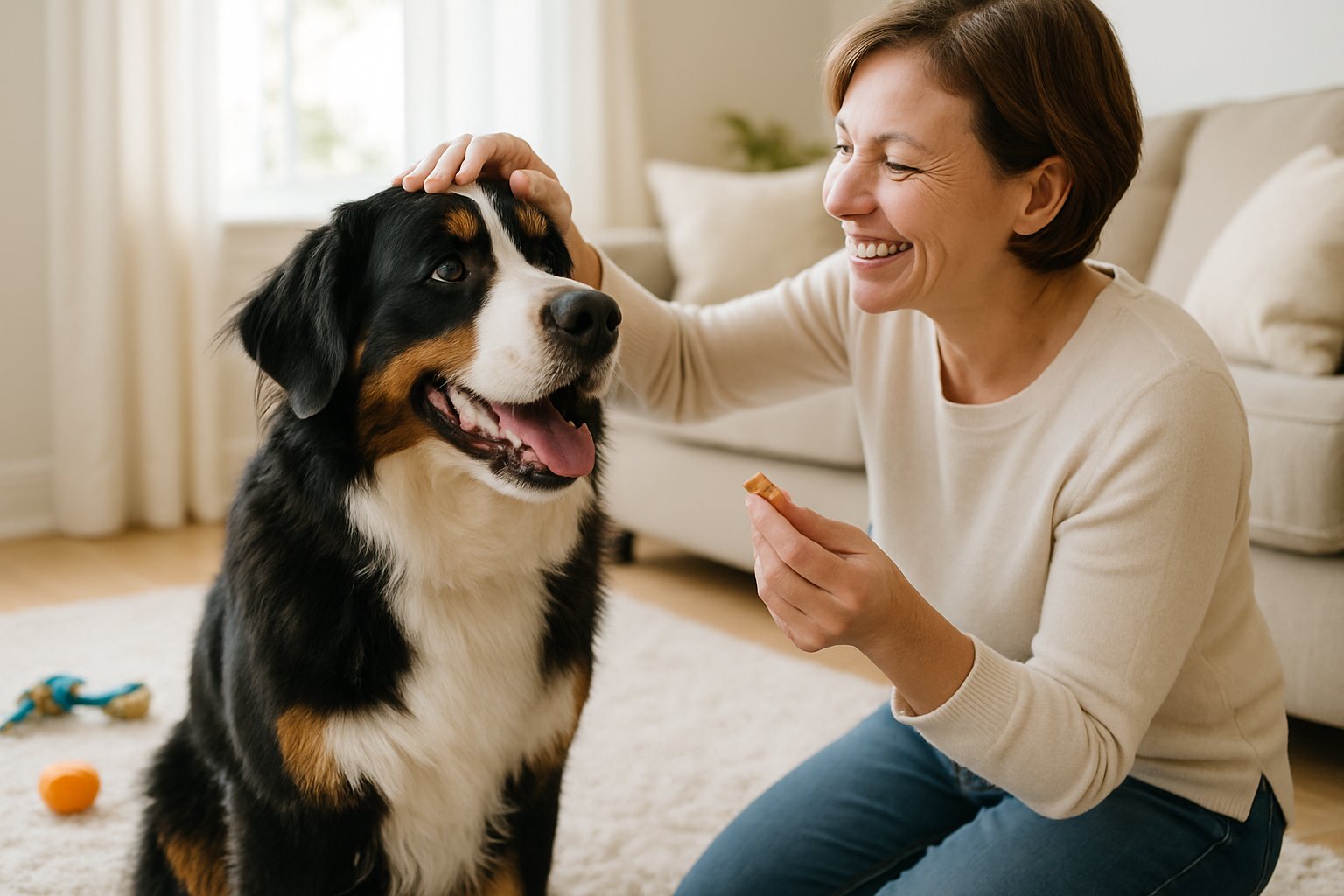Training your Bernese Mountain Dog can help you build a strong relationship and ensure your dog is well-behaved at home and in public. These gentle giants are eager to learn but need clear guidance and regular practice to thrive.
Learning the best practices for training your Bernese Mountain Dog makes daily life smoother and more enjoyable for both you and your pet. With the right approach, you can set your Berner up for success and bring out the best in this loyal breed.
1. Start training early to establish good habits from puppyhood.
Begin training your Bernese Mountain Dog as soon as you bring your puppy home. Puppies are most receptive to new experiences between eight and sixteen weeks old. This is the best time to help your puppy learn household rules, social manners, and basic commands. Early training helps your Bernese Mountain Dog get used to your family and surroundings. Exposing them to gentle handling, sounds, and new places at a young age will make them more confident and well-adjusted adults.
2. Use positive reinforcement with treats and praise to encourage desired behavior.
Positive reinforcement is one of the most effective ways to train your Bernese Mountain Dog. This method means you reward good behavior right after it happens, making it more likely your dog will repeat it. Give your dog a small treat or use clear praise such as “good job” each time they follow a command. This helps them understand which actions you want them to do again.

3. Maintain consistency in commands and routines for better learning.
Using the same commands every time helps your Bernese Mountain Dog understand what you want. Stick to simple words for each cue, like “sit” or “stay,” instead of switching between similar words. This reduces confusion and makes your dog more likely to respond correctly. Consistency in your daily routines is also important. Dogs feel more secure when they know what to expect, whether it’s walking time, feeding time, or training sessions. This regular structure can lead to better behavior and quicker progress during training.
4. Teach basic obedience commands: sit, stay, recall, down, and heel.
Start by focusing on key commands like sit, stay, recall (come), down, and heel. These are the foundation of good manners and help keep your Bernese Mountain Dog safe in daily life. Use positive reinforcement to encourage your dog. Give treats or praise each time your dog obeys a command. Keep lessons short and end on a positive note so your dog stays interested.
5. Socialize your Bernese Mountain Dog with other dogs and people.
- Start socialization early, ideally when your Bernese Mountain Dog is between 3 and 16 weeks old. This is a key period when your puppy is most open to new people, animals, and places. Introducing new experiences during this window can reduce fear and help your dog grow up confident.
- Expose your Bernese Mountain Dog to a variety of environments, sounds, and situations. Safe exposure to different dogs and people teaches your dog how to interact calmly. Make sure each experience is safe and positive to avoid causing anxiety or fear.
- Use positive reinforcement, like treats and praise, to reward your dog for calm and friendly behavior around others. This helps your Bernese understand what is expected and builds trust in you. Consistency and patience are important as your dog learns these skills.
- Avoid forcing interactions if your dog is scared or unsure. Pressuring your puppy can lead to fear and social problems later. Instead, let your dog approach new situations at their own pace and always supervise meetings with other dogs.
- If you need extra help, consider enrolling in a puppy class or working with a qualified trainer. Training classes give your Bernese Mountain Dog the chance to meet other dogs and give you expert guidance on managing social behavior.
6. Exercise your dog regularly to reduce excess energy and improve focus.
Bernese Mountain Dogs are large, active dogs. They need regular exercise to stay healthy and happy. Without enough activity, they can become bored or restless. Daily walks help burn off energy and make your dog calmer. Playing fetch or going on hikes are also great choices for this breed. Make sure the exercise matches your dog’s age and health.
7. Establish yourself as the pack leader without using fear or harsh methods.
Your Bernese Mountain Dog wants to feel safe and confident with you in charge. The best way to become the leader is through clear rules, patience, and consistency. Leadership does not mean being mean or strict. Set simple boundaries for your dog, like waiting before eating or not rushing through doors before you. Give directions using a calm and even voice. Avoid yelling or using force.
8. Incorporate mental stimulation through puzzle toys and advanced training.
- Bernese Mountain Dogs are intelligent and need regular mental challenges. Without enough stimulation, they can become bored or even develop problem behaviors.
- Puzzle toys are a practical way to keep your Bernese’s mind active. These toys encourage problem-solving and help your dog think through new tasks and situations. You can find a variety of dog puzzle toys designed for different skill levels to keep things interesting.
- Advanced obedience training is also important. Teaching commands beyond the basics, such as “leave it,” “find it,” or new tricks, can exercise your dog’s brain. Short training sessions a few times a week work well for this breed.
- Mental exercises support healthy brain function and have been linked to better behavior in dogs. Adding puzzle toys and games into your routine can help your Bernese stay sharp and focused.

9. Redirect unwanted behavior immediately with clear commands like ‘stop’ or ‘leave it’
When your Bernese Mountain Dog shows unwanted behavior, act right away. Use simple commands like “stop” or “leave it” in a calm, firm voice. This helps your dog know exactly what you expect at that moment. Redirect their attention to a better behavior as soon as you give the command. For example, if your dog grabs something they shouldn’t, say “leave it,” then offer a toy or treat when they listen. Consistent, clear direction helps your dog learn faster and feel secure.
10. Use short, frequent training sessions to keep your dog engaged.
Short training sessions help your Bernese Mountain Dog stay focused and interested. This breed can get bored or frustrated during long lessons, so keep each session around 5 to 10 minutes. Aim for two or three sessions each day instead of one long period. This helps your dog learn faster and keeps training positive. For young Bernese Mountain Dogs, even shorter sessions of 3 to 5 minutes work better because puppies have shorter attention spans.



